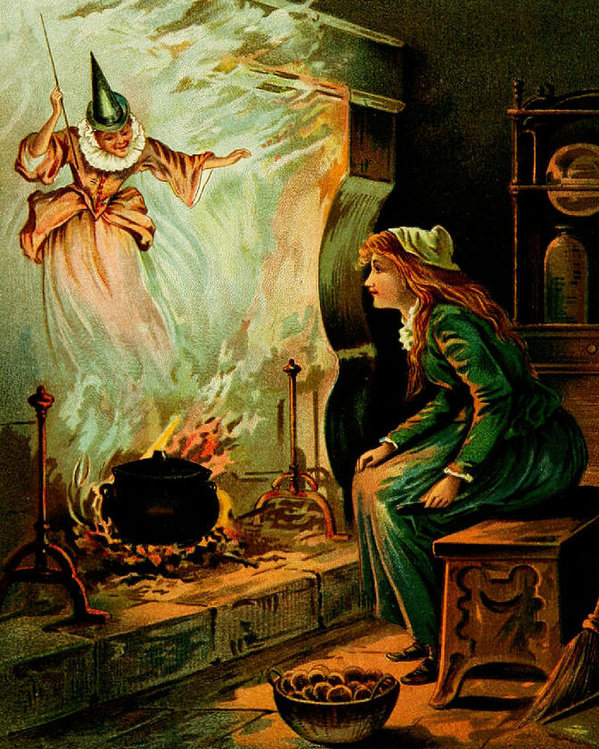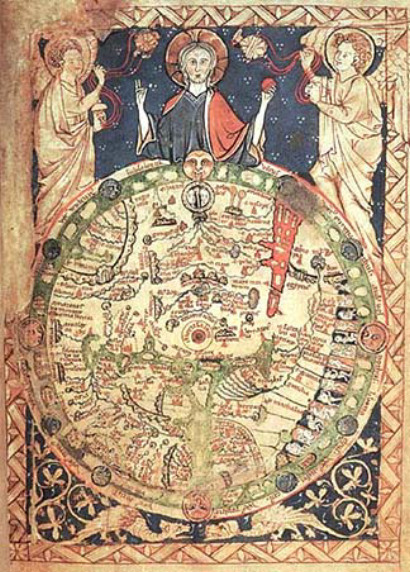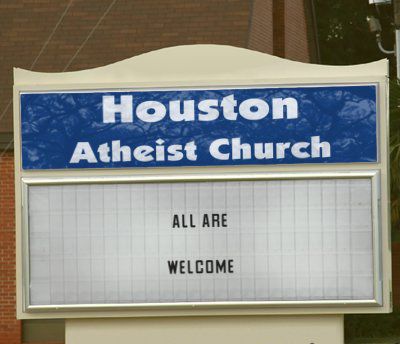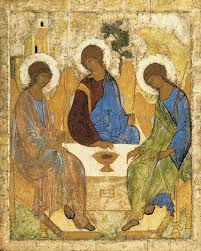Four years ago, along I-94 west of downtown Milwaukee, these words were on a billboard sponsored by a local atheist group. I read that these appeared in other places too. Well, it’s a free country…
…and if this challenges Christians to think it will be  a good thing. I suspect more than a few of us are afraid to think about the Faith, and especially the Christmas stories, for fear they might actually be only a fairy tale, the whole Christian thing a made-up story with no evidence for it, like the old pagan myths. I think that’s what the atheists meant here by “fairy tale”.
a good thing. I suspect more than a few of us are afraid to think about the Faith, and especially the Christmas stories, for fear they might actually be only a fairy tale, the whole Christian thing a made-up story with no evidence for it, like the old pagan myths. I think that’s what the atheists meant here by “fairy tale”.
So let’s take a look at the evidence for our Faith – the existence of God, God’s revelation of himself, Christ and Christianity, and finally what the atheists were specifically targeting: the  Christmas stories. We’ll also consider the evidence for true atheism, or rather the lack thereof. We’re going to take a rational approach to all this. There is, of course, a lot more behind peoples’ Christian Faith than reason. We’ll come to that.
Christmas stories. We’ll also consider the evidence for true atheism, or rather the lack thereof. We’re going to take a rational approach to all this. There is, of course, a lot more behind peoples’ Christian Faith than reason. We’ll come to that.
But our Christian faith needs to be in accord with reason. For Christ, after all, is the Logos, the λόγος, which in Greek means not only the Word of God as we usually translate it, but also the Reason of God. (The meaning isn’t completely expressible in English.) Jesus Christ is the personal Reason, the rational Order Who upholds the universe.
Therefore we are going to consider the reasons and evidence for Christianity, especially the Christmas stories. We’ll come to that. But first…
I. A (perhaps boring, but necessary) Prologue about Fact, Evidence, Reason and Faith
If you think we’re going to try here to prove Christianity, forget it. We cannot prove the Faith. The fact is we cannot prove anything. People say “I don’t believe in God because you can’t prove he exists.” Look, fellah, I can’t prove you exist. I may still be in bed dreaming all this. Maybe you’re a figment of my imagination. There’s the old Chinese tale about the philosopher who dreamt every night that he was a butterfly, then woke up and was a man again. Eventually he wondered whether he was a man dreaming he was a butterfly or a butterfly dreaming he was a man, and he couldn’t prove it either way. Life doesn’t give us proof. In all things we move by faith, hopefully a reasoned faith backed up by solid evidence.*
* For reasons I do not understand, many people today willfully believe things which are contrary to fact and evidence. Reputable government and professional climatologists produce a report which says there is about a 99.9% probability that global warming has human cause and is dangerous – and the response is simply “I don’t believe it”. Some have described the modern world as a “fact-less society”. Some say that there are “facts” and “alternate facts”. This is nonsense. There is demonstrable fact and there is fiction. There is truth and there is falsehood. Senator Daniel Patrick Moynihan once said, “Everyone is entitled to his own opinion, but not to his own facts.” Without accepted facts, civilized society falls apart. We are now well beyond the early stages of this process. I, the old man, have spoken.
Let’s get down to earth about this. Last Sunday I got out of bed, got dressed and went to church not because I could prove people would be there, but rather because of faith based on evidence. The evidence was that Saint Nicholas’ people have never all skipped out before, and I reasoned that almost certainly they wouldn’t do it now, and so in faith I went to church, and there they were! But I couldn’t be sure till I got there. Even then I might still have been in bed dreaming it.
The reasons for believing in God and having faith in Christ work the same way. AS I said, people don’t believe only because of evidence and reason. In fact most of us believe primarily for other reasons. (I first took God seriously because one Saturday afternoon he batted me over the head with his presence.) That’s fine, so long as what we believe is not contrary to reason, to Christ the Logos of God. That is why the Epistle to the Hebrews tells us, “faith is the substance of things hoped for, the evidence of things not seen.” Hebrews 11:1 Substance. Solid evidence. That’s why the Church has us keep saying the Creed – what we believe and why we believe it.
Likewise, atheism cannot be proved. In fact that’s even more difficult. Negatives cannot be proved. Atheism is a faith.  In fact some atheists now meet regularly, usually weekly, to support each other in their faith. For example: https://www.houstonoasis.org/ However, if we listen closely, often we find that atheists are not really atheists. What they are rejecting is God’s love, because of bad things that have happened to them or those they love. They’re really saying they can’t believe there’s anyone up there who cares. Be sympathetic to that. Sometimes life feels like that for all of us. Because of the Cross of Jesus Christ, we know better. But sometimes the world looks like there’s nobody in charge here. However, that’s not an argument against the existence of God. Also some atheists likely disbelieve because of nasty or hypocritical or closed-minded Christians or because of scandals in the Church. That’s understandable. Or maybe their idea of God is so off base that we Christians disbelieve in that “god” too. Please don’t reject atheists out of hand. We Orthodox do say a lot about the God who is “ineffable, inconceivable, invisible, incomprehensible”, do we not? from the Divine Liturgy of Saint John Chrysostom
In fact some atheists now meet regularly, usually weekly, to support each other in their faith. For example: https://www.houstonoasis.org/ However, if we listen closely, often we find that atheists are not really atheists. What they are rejecting is God’s love, because of bad things that have happened to them or those they love. They’re really saying they can’t believe there’s anyone up there who cares. Be sympathetic to that. Sometimes life feels like that for all of us. Because of the Cross of Jesus Christ, we know better. But sometimes the world looks like there’s nobody in charge here. However, that’s not an argument against the existence of God. Also some atheists likely disbelieve because of nasty or hypocritical or closed-minded Christians or because of scandals in the Church. That’s understandable. Or maybe their idea of God is so off base that we Christians disbelieve in that “god” too. Please don’t reject atheists out of hand. We Orthodox do say a lot about the God who is “ineffable, inconceivable, invisible, incomprehensible”, do we not? from the Divine Liturgy of Saint John Chrysostom
Likewise Christians may believe because they’ve been raised in the Church and can’t imagine otherwise. Or they’ve found by experience that the Christian way works, that loving is better than hating, forgiving better than holding a grudge. People may believe because God has moved in their life in a way they can’t deny, or because they feel the need for meaning in life and Christianity provides it, or because they need help beyond human powers, or because of death which causes them to desire eternity. No problem at all, so long as it’s not contrary to facts, evidence, reason.
But please let’s have no blind faith in anyone, anything. People have ignored facts and evidence and put faith blindly in all sorts of things: Communism, Naziism, the unfettered free market, ISIS, “our Dear Leader” and many more – and you know what comes of that. I remember in the 1970s actress Shirley MacLaine declaring, after a quick visit to China, that Mao Tse Tung had proved that human nature really could be changed. Right…!
So now finally back to the billboard: What is our answer to the atheist contention that Christianity is wishful thinking with nothing to back it up.
II. The Evidence for God
This one is easy. The evidence is the fact that I am sitting here at my laptop writing this. The cosmos exists. A book requires an author. Existence requires a Creator. If you were traveling out in the middle of nowhere and came upon a bus filled with people (even if the bus was beat up, even if some of the people seemed a bit demented) you would immediately ask the obvious question: who made it? who put it here? and why?
The cosmos exists. A book requires an author. Existence requires a Creator. If you were traveling out in the middle of nowhere and came upon a bus filled with people (even if the bus was beat up, even if some of the people seemed a bit demented) you would immediately ask the obvious question: who made it? who put it here? and why?
So here is the cosmos hanging out in the middle of nowhere. Astrophysicists tell us it began with a big bang about 13 billion years ago. But that doesn’t explain anything. The big question is: What caused the big bang or rather Who? Existence requires a Creator.
Furthermore, the universe has design and order. Even if there is some disorder in certain places and levels of creation (with us on earth, for one unfortunate example) the stars keep moving in their courses, the sun keeps shining, our bodies (amazingly) keep functioning for a while. All this design requires a Designer, a Rational intelligent Mind.
Not only that: Things keep existing. I read that some subatomic particles appear to go quickly in and out of existence, but most things don’t: the sun, the moon or my laptop, nor do I so far as I can tell. Continuing existence requires a consistent Power that keeps  everything going. A Sustainer.
everything going. A Sustainer.
You can see here that, using fact, evidence and reason alone, we’re already right at the edge of the Three-Personed God.
All this is Who we mean by the word “God”. Dear atheists, are you really telling us, based on fact and evidence, that reason tells you that no one is doing all this? It just is? Don’t you ever wonder Who? For some reason you’re just incurious, refusing to ask these big questions, refusing to think about it? This leaves you with blind faith that there is no God.
Once we think about it, it seems obvious to most of us today that God exists. I cannot even imagine otherwise. But looking back, it took mankind a very long time to reach this conclusion. So…
III. How did mankind come to believe in God?
Not by reasoning. That’s not surprising if you stop to think about it. Reason tells us that there is much more to life than reason!
For this, we must narrow our scope to one people, the early Hebrews. How did the Jews come to believe in the one Creator God? Was it because their wise scholars deduced this by reason? No. They said they believed in God because God had revealed himself to them.
Was the faith of the Jews based on “fairy tales”? on myths like the pagans around them? That’s not what the Jews said. The whole point of the Old Testament was: Put away the pagan myths and fairy tales, give up your false gods, and turn to the one true God.
I think the only way to judge that claim is by circumstantial evidence: what it produced. Out of this little tribe of Jews, an almost insignificant people compared to the great nations around them, came ideas radically new in their day and which have come to be accepted by much of mankind today -Jews, Christians and Muslims, nearly four billion people.
1 First, monotheism itself: there is one true Creator God, around whom our lives can be unified.  When the great Greek philosophers were just beginning to think there must be one unitive source of everything within the universe, theJews had long known that there is one Creator who exists beyond the universe. No other people believed this.
When the great Greek philosophers were just beginning to think there must be one unitive source of everything within the universe, theJews had long known that there is one Creator who exists beyond the universe. No other people believed this.
2 God is righteous and demands goodness of all. And he will judge. There will be an accounting.
3 The idea that history goes not in circles but can progress, is moving towards something. Almost everybody now believes this, takes it for granted. Even most secularists believe in the eventual triumph of goodness on earth.
4 The brotherhood of all mankind. This is the obvious consequence of God’s creating us, male and female, in his image. It seems to be taking almost forever for this idea to be taking hold, doesn’t it? and few of us have lived it out very well.
5 The equal value of men and women – again because God created us both male and female in his image. This also we’re still working on, to put it mildly.
6 Creation is good because God made it, and it reflects his order and goodness – and so is to be respected and preserved, not ravaged. Oh help! We just seem to accept the principle, and then we slip backwards again. Nevertheless, this belief is the foundation of science and technology. It was in medieval Muslim and later in Christian cultures that believers, based on the doctrine of God’s creation, first began to develop modern science. It’s beyond sad that some scientists now reject their source, and that the occasional brilliant scientist publicly rejects God for reasons that are not scientific.
Muslim and later in Christian cultures that believers, based on the doctrine of God’s creation, first began to develop modern science. It’s beyond sad that some scientists now reject their source, and that the occasional brilliant scientist publicly rejects God for reasons that are not scientific.
All this and more, which much of the world now takes for granted, came from the Jews who, at enormous cost to themselves rejected the myths and fairy tales of the peoples around them, in the name of the one true God. That’s the evidence for how Faith in the one God, with all it implications and results, came to mankind.
Dear atheists, please explain all this away if you can. I can’t.
Next Week: The Evidence for Faith in Jesus Christ and for the Christmas Stories
Week after next: The History of Everything


Love this article, Fr. Bill. I live down in Kenosha and attend an OCA church that I love dearly. Will have to come up and visit sometime. Blessed Nativity to you and yours!
Dear Father Bill,
I just love your blog!
I am a fairly new subscriber and thoroughly enjoy your style of writing and the edification of our faith. I also love how you do not hesitate to remind us that at your age you’ve been around the block…”I, the old man, have spoken”! There is something to be said about growing older (I’m 65). The mileage gathers a lot of experience. By God’s grace we learn from it! Somehow I have this idea that I’ve earned the right to ‘tell it like it is’, within reason of coarse! Not that anyone listens… 🙂
Anyway, thank you. I look forward to your posts. “The History of Everything”…now you’ve got me wondering….!!
Re “tell it like it is”. 1) Yes, it is extraordinarily useful to see things in the light of 70 years watching. Modern American politics for example: some things that were wildly left wing 60 years are now main-stream. Some things that were rabidly right wing 70 years ago are now middle of the road. Other things the reverse. 2) My experience is that about age 70, many Orthodox ladies let loose and “tell it like it is”. Loud. Good for them. But stand back! Orthodox men (he said humorously) remain as docile and placid as always…
Certainly believe when facts are available that the conclusions may be correct. Unfortunately it has become politically incorrect to use scientific methods when investigating climate change.
My background was in Prehistoric Archaeology in the 1960s when we students learned of natural climate changes when dry areas became grass lands and people moved with their flocks, like Abram. No one knows why the climates of the earth changed then, so … but I am just being politically incorrect and must stop writing. I’ll say this I don’t believe the results of surveys of scientific evidence. I’m a product of the WWII generation and we have seen too much propaganda not to recognise it now. Surveys can produce any desired result So many societies where people could not give their opinions freely are what we remember
and we recognise them coming again in churches as well as in local and national governments.
This is from a New Zealand perspective. I doubt the U S is all that different.
New Zealand! I’m glad to have a friend on the other side of the sphere! I probably should have used an “evidence” example from theology which might be easier to deal with. Nevertheless, as you probably have read, my background also was in science – meteorology. Here’s my reading: Yes, in science as in everything else there is a great tendency to go along with the crowd. However, the crowd may be right. Yes, there have been climate changes throughout earth’s history, and there is only speculation from our great “distance” as to what caused them. However in this case, the warming appears to be much more rapid than previously, and the increase in manmade CO2 in the atmosphere aligns almost exactly with the increase in warming. This appears extremely likely to be the cause. I don’t know about New Zealand, but in the USA those who don’t believe this, or who don’t even believe the earth is warming, are numerous and powerful, and at this point in history it’s hard to say which side is now “politically incorrect”. I’d compare this to the situation with cigarets and nicotine 50 years ago. The argument was that the connection with lung cancer hadn’t been “proved”. Of course not. Nothing is provable. We work by the preponderance evidence, as you know. Maybe so many smokers just happened to get lung cancer and many fewer non-smokers got it for some other unknown reason or by coincidence. However… I think it’s the same with the relationship of CO2 and global warming. Not provable, but very very likely. At least that’s my unprovable opinion.
Dear Father Bill,
Who are the four Muslim scientists on the picture you inserted into the text, and in what way did they develop modern science? They are labeled as “founders* of algebra, sociology, optics and geography – as you inserted that picture, could you please briefly explain why it is them who can be regarded as “founders” of those disciplines (as the caption states) and how it is that those four Muslim scientists can be considered to have developed those sciences in their “modern” form prior to Christians, as your text next to the picture implies?
Thank you very much!
I’m glad you asked. I was in a hurry and posted that image without digging into it, not a good thing to do. I’m thinking that the term “founders” is an exaggeration, since these were ancient disciplines, not new in the Middle Ages. Perhaps “major contributors” would be a better title? See below. The major Christian “contributors” to modern science and math came along in the late Middle Ages in western Europe, often encouraged by Popes and RC bishops – contrary to popular mythology. I read a really good book about this, but can’t remember its name right now, nor can I find it. Sorry.
Since you asked, the following is all from “The Encyclopedia Brittanica” (which gives much more information about them, if you want to look):
1) Al-Khwārizmī, (born c. 780—died c. 850), Muslim mathematician and astronomer whose major works introduced Hindu-Arabic numerals and the concepts of algebra into European mathematics. Latinized versions of his name and of his most famous book title live on in the terms algorithm and algebra.
2) Ibn Khaldūn, (born May 27, 1332, Tunis [Tunisia]—died March 17, 1406, Cairo, Egypt), the greatest Arab historian, who developed one of the earliest nonreligious philosophies of history, contained in his masterpiece, the Muqaddimah (“Introduction”). He also wrote a definitive history of Muslim North Africa.
3) Ibn al-Haytham, (born c. 965, Basra, Iraq—died c. 1040, Cairo, Egypt), mathematician and astronomer who made significant contributions to the principles of optics and the use of scientific experiments/
4) Ash-Sharīf al-Idrīsī, (born 1100, Sabtah, Mor.—died 1165/66, Sicily, or Sabtah), Arab geographer, an adviser to Roger II, the Norman king of Sicily. He wrote one of the greatest works of medieval geography, Kitāb nuzhat al-mushtāq fī ikhtirāq al-āfāq (“The Pleasure Excursion of One Who Is Eager to Traverse the Regions of the World”).
Glad to see some apologetics on AFM. It’s sorely needed and lacking in Orthodoxy. Not too impressed with David Bentley Hart’s books which takes more from Aquinas’s conception of God than the Eastern one. David Bradshaw has shown the flaws in Hart’s approach.
Swinburne, who IS Orthodox, and has done more to promote natural theology (no, not PROVING God’s existence, no philosopher today speaks this way) could still do more to draw from Eastern sources.
If more Orthodox were critically aware of Alvin Plantinga, Bill Craig, Robin Collins, and Swinburne, the Orthodox world would benefit. We can take the good and leave the bad.
Thanks, Mark. You clearly have read more about this than I have. In previous years, I was subjected to so much faith-denying “non-apologetics”, that I had to think my way out of that in order to move on. Actually it hasn’t been hard. Much of it is so shallow. I remember the “Jesus Seminar”, wherein 150 Biblical scholars analyzed the Gospels and deigned to inform us what Jesus said (red print), what he might or might not have said (grey print) and what he definitely did not say (black print). Really…?!
I find it amusing that the billboard in question addresses “Santa” who as far as we Americans have treated him IS a fairytale character…